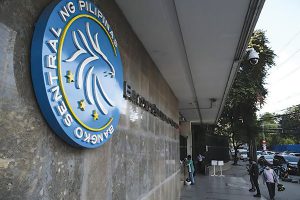Bloomberg
Monetary authorities in Indonesia and the Philippines delivered large interest-rate increases to curb inflation and support their currencies, while signalling their approaches to policy tightening may differ from here on.
Bangko Sentral ng Pilipinas raised the key rate by a previously announced 75 basis points to 5%. Shortly after, Bank Indonesia lifted its benchmark rate by half-point to 5.25% as expected by 22 of 33 economists in a Bloomberg
survey.
The peso, Southeast Asia’s worst performer this year, closed little changed while the rupiah, which emerged as Asia’s biggest loser this quarter, pared losses after the decision, to close 0.4% against the dollar.
In simultaneous briefings held 2,635 kilometers (1,637 miles) apart in Manila and Bali, central bankers spoke in one voice on inflation: it must be contained. But they were split on the need to persist with large hikes going forward amid signals that the Federal
Reserve may pivot to smaller
increases.
“This decision to raise rates is a front-loaded, preemptive and forward looking step to lower inflation expectations that are still high,†BI Governor Perry Warjiyo said, reiterating the language he used a month ago. Although late to join the tightening club, the BI has
delivered 175 basis points of
increases in four moves.
Still, Warjiyo cautioned against complacency, citing the bank’s ambition to keep its preferred core inflation gauge from breaching the 2%-4%
target early next year.
At the same time, Governor Felipe Medalla, who’s led the BSP in delivering 300 basis points of rate adjustments since May, said there was room for the Philippines to be less hawkish.
The “Fed rate now is not the highest, but the four 75 basis-points are the highest rate of increase for a long time,†according to Medalla. “I think that’s over, and therefore we are slowly going back to a more normal global interest rate
environment.â€
“Therefore, we will probably do less,†Medalla said, even as the BSP raised its inflation forecast for the current year and next to 5.8% and 4.3%,
respectively.
The size of BSP’s future increase “will hinge on inflation and movements in the peso,†Bloomberg Economics’s Tamara Henderson wrote in a report. On Bank Indonesia, she expects another 50 basis-point
increase in December.
“Warjiyo’s comments thus far err on the hawkish side,†said Frances Cheung, rates strategist at Oversea-Chinese Banking Corp. in Singapore. “Risk of further tightening and continued Operation Twist shall keep the Indonesian government bond yield curve flat.â€
The decision should help shield the rupiah that’s been battered by global volatility, weakening nearly 3% this quarter. As the Federal Reserve and other major central banks aggressively tighten their policies, foreign funds sold off nearly $540 million in Indonesian government bonds from October 1 to November 15.
 The Gulf Time Newspaper One of the finest business newspapers in the UAE brought to you by our professional writers and editors.
The Gulf Time Newspaper One of the finest business newspapers in the UAE brought to you by our professional writers and editors.
